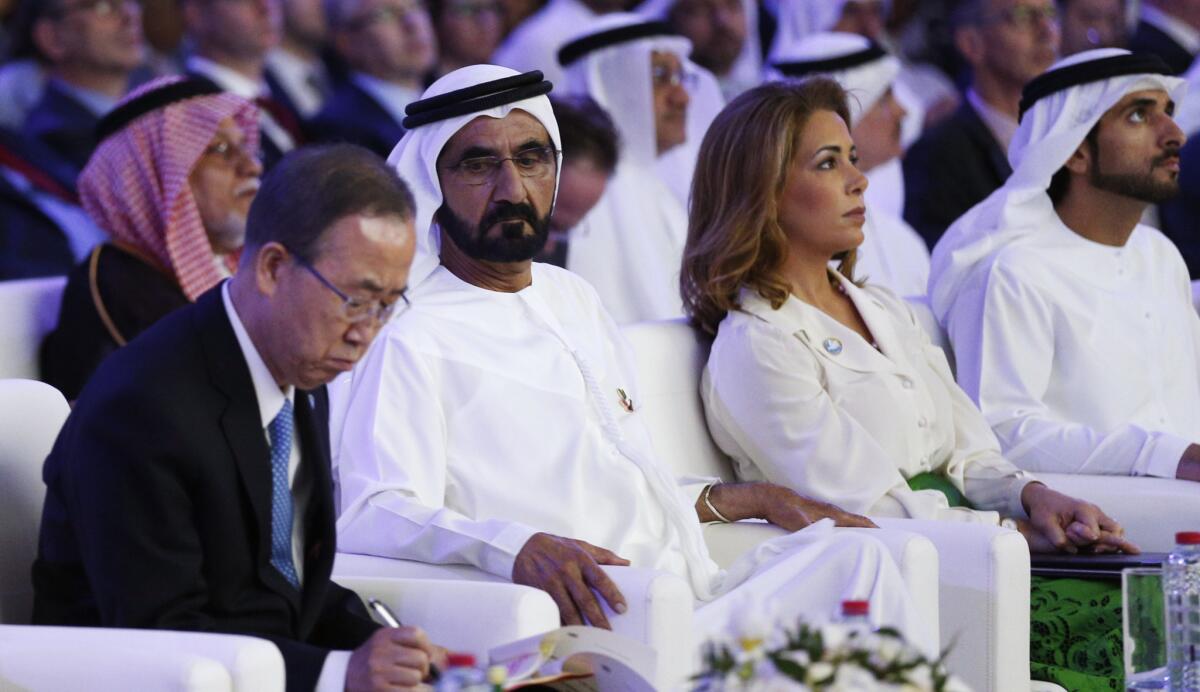Intrigue, secrecy — an angry poetic outburst — surround reports of runaway Gulf princess

- Share via
Reporting from London — The plotline reads like an international high-society drama: A glamorous princess, fleeing her marriage to an aging Gulf potentate, is said to seek shelter in the poshest precincts of London.
From the husband scorned comes an online outburst of floridly furious poetry.
In the background are two intermingled Mideast monarchies, a looming court battle and a dark tale of the abduction and abuse of at least one other female royal.
The princess in question is Haya bint al Hussein, 45, half-sister to the king of Jordan, an Oxford-educated equestrienne with Olympic credentials who is a glossy fixture on the circuit of iconic British society events like the Royal Ascot.
She is the sixth wife of Sheik Mohammed bin Rashid al Maktoum, 69, billionaire ruler of the wealthy Persian Gulf emirate of Dubai, the most populous of the United Arab Emirates. The two wed in 2004.
There has been no official confirmation of reports that Princess Haya is seeking political asylum in Britain, after initially fleeing to Germany. The Home Office, which handles questions of citizenship and asylum, said in response to queries on Wednesday that it could not comment on individual cases.
But British media reports have placed her in the country for the past few months. On Monday, the Times of London reported that the princess had taken up residence in a $107-million mansion near Kensington Palace with her 11-year-old daughter and 7-year-old son. News outlets including the BBC have cited sources as saying she fears potential abduction and forced return to Dubai.
Such fears would not seem unfounded. The princess would be at least the third known female member of the Emirati royal family to try to break free, following reports that two of the sheik’s daughters were captured and returned home after escape attempts, one in 2000 and the other last year.
Speculation about the couple’s marriage was fueled late last month when Sheik Mohammed posted a poem on his website that was an enraged missive to an unnamed female interlocutor — written in a classic Arabic literary style known as hijaa, or invective.
Brimming with references to treachery and betrayal, it reads: “The era of your lies has ended … you no longer have any place with me.” The poem concludes: “I do not care if you live or die.”
The curious scoured the sheik’s couplets for clues they were directed at Haya. The princess and her husband are both deeply involved in equine pursuits — he founded a thoroughbred horse-racing stable, and she is a former Olympic show jumper — and one line of his poem contains an accusation: “You let the reins of your horse go slack.”
As gossip grew louder that the princess had fled the palace for good, Sheik Mohammed’s media office issued a statement denouncing those who spread “rumors and lies.” But the poetry section of his website — there is an entire section devoted to his verse — also notes that all his poems stem from “personal experience, event or situation.”
“I have never written any verse without it being a reality of my life,” he wrote.
Stories of women fleeing repressive conditions in Saudi Arabia and the United Arab Emirates have repeatedly made headlines in recent months, and some news accounts have suggested the princess’ plight could be tied to earlier episodes within the family — particularly the case of Latifa bint Mohammed al Maktoum, a daughter of the sheik by one of his five other wives.
Last year, she managed a clandestine escape from the emirate, only to be captured at sea off the coast of India by armed men and returned home, according to a companion’s account. Beforehand, she recorded a video, later posted on YouTube, saying that “either I’m dead or in a very, very, very bad situation.”
At least one advocate said publicly that Haya may have learned damning information about the treatment of Latifa — even though she was suspected by some as having participated in a cover-up of what happened to the younger woman after she was forcibly returned home.
At the time, Princess Haya, along with former Irish President Mary Robinson, appeared in controversial photos that were released by Emirati authorities and apparently intended to provide proof of Latifa’s well-being. But the listless, dull-eyed appearance of the younger princess, now 33, prompted a new wave of concern about her treatment.
“Princess Haya, in all likelihood, is both a victim and a witness,” said a statement from Radha Stirling, who heads the group Detained in Dubai. “Thus we hope she will remain safe, and that she will also cooperate with international authorities to expose the alleged abuses going on behind the doors of the Dubai royal palace.”
The potential fallout of a royal divorce could extend well beyond the family home. Princess Haya has long been a popular and well-known figure in Jordan. Her father was the late King Hussein, and the current monarch, King Abdullah, is her half-brother.
She represented Jordan in her 2000 Olympic turn, and posters featuring the princess on a horse were once ubiquitous in taxis in Jordan’s capital, Amman.
Jordan, whose finances are precarious, relies on largesse from both the UAE and Saudi Arabia. Some 200,000 Jordanians work in the Emirates, sending home hundreds of millions of dollars in remittances every year.
The kingdom is also eager to ensure solidarity with Gulf leaders as it navigates the upcoming release of the Mideast peace plan spearheaded by President Trump’s son-in-law, Jared Kushner. Jordan fears the U.S. initiative might include pressure on it to grant citizenship to more than 1 million Palestinian refugees.
The response by Sheik Mohammed’s media office to rumors about his wife’s whereabouts, which featured smiling pictures of the couple, contained what could either be an affirmation of the ties between the two royal families — or perhaps a warning.
“A salute of homage and respect to my wife Haya, the daughter of Hussein,” it read.
Special correspondent Boyle reported from London and Times staff writer King from Washington.
More to Read
Sign up for Essential California
The most important California stories and recommendations in your inbox every morning.
You may occasionally receive promotional content from the Los Angeles Times.










